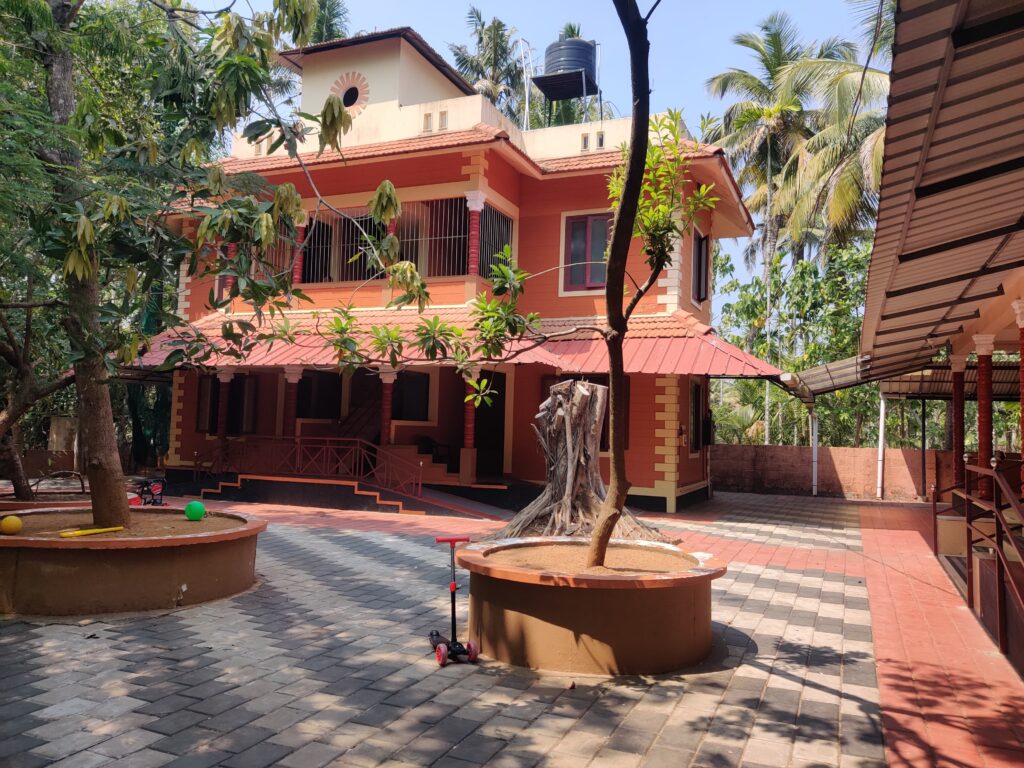In a quiet village in Kerala’s Thrissur district, two boys, Raju* and Aman*, played on the same swing. Raju pushed it with excitement, running around restlessly, while Aman sat lazily, getting tired quickly and often asking his mother to carry him. Despite their differences, they had one thing in common—they were both on the autism spectrum and undergoing treatment at Sunethri Ayurveda and Research Centre. This was their third in-house treatment, and by now, even their mothers had become close friends.
At first glance, this place looked more like a retreat than a medical center. Surrounded by greenery, the calls of peacocks and cuckoos filled the air, and children climbed trees or played freely. But a closer look revealed a different reality—many children struggled to make eye contact, flapped their hands, hummed to themselves, or engaged in risky behaviors. Some would become aggressive, hitting themselves or others. Most had difficulty communicating, following instructions, or keeping up with developmental milestones. For these families, modern medicine offered little beyond speech and occupational therapy, as there is no known cure for autism.

But why is there a rise in the number of autism cases? Is it simply better diagnosis, or is something fundamentally changing? In India, studies suggest 1 in 100 children are on the spectrum. While research hasn’t pinpointed a single cause, common factors include a history of recurrent fevers, parental smoking, late maternal age, and possibly genetic modifications. Many parents also noticed increased autistic tendencies in children after excessive screen exposure, especially post-COVID.
Our bodies and minds are shaped by what we consume—food, air, thoughts, and experiences. Our genetic constitution is influenced by generations before us. Drastic lifestyle changes, from diet to parenting styles, may be contributing to rising developmental disorders.
Parents came to Sunethri because they saw their children improving with Ayurvedic treatments, including various internal medicines and Panchakarma therapies, under the care of Vd. M. Prasad. Ayurveda approaches autism differently, focusing on identifying and addressing the root causes.
Autistic patients were often seen to have digestive imbalances (Agni dushti), which caused doshas to vitiate and lead to disturbances in mental pathways (Manovaha srotas dushti). Just like how one can’t see clearly through a cloudy mirror unless it is cleaned, a mind cannot develop unless it is cleared of vitiated doshas.
A crucial aspect of treatment was diet—children followed a gluten-free, soy-free, and casein-free regimen, as these substances are heavy to digest and can contribute to hyperactivity. Modern research also supports the link between gut health and neurological function. Additionally, screen time was completely eliminated, as excessive exposure further hindered their development, pulling them deeper into their inner world.

During our 10-day visit to Sunethri, my friend and I observed both the outpatient and inpatient treatments and spoke to several parents. Many children showed remarkable progress—some who were previously nonverbal had started speaking, others became more social, and many were now able to dress themselves, use the toilet independently, or sit calmly in a classroom. While every case wasn’t curable, depending on the age and severity of being on the spectrum, even in such cases, improvements were visible.
Here, healing wasn’t just about medicine—it was about care, patience, and love. The children weren’t treated as patients but as individuals with unique needs, abilities, and potential. Watching parents share their struggles and small victories, we realized that autism isn’t just a medical condition; it’s a journey.
We often see this journey being portrayed in media through movies like My Name is Khan, where Shah Rukh Khan’s character Rizwan Khan has Asperger’s syndrome, or the character of Dr. Shaun Murphy in the TV series The Good Doctor, which often creates an image of autism as a disease of intelligent people lacking social skills. But that isn’t always the case for every patient. Autism doesn’t just affect the person diagnosed with it—it also affects their parents, teachers, therapists, and anyone who interacts with them.
As we left the center, we carried with us a deep respect for the families fighting this battle every day. Their hope, despite the uncertainty, was inspiring. While autism may not have a definitive cure, places like Sunethri prove that with the right environment and appropriate Ayurvedic treatment under a good vaidya, these children can grow, learn, and find their place in the world.
*Names of children have been changed to maintain privacy.


Thank u sakina for sharing such a wonderful experience and making people believe ayurveda🙌🏻